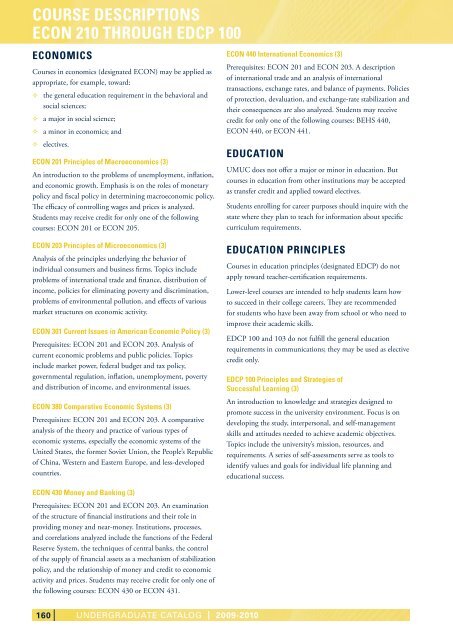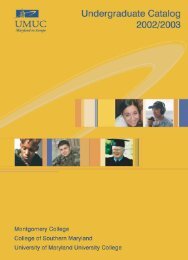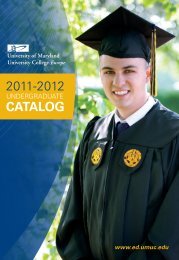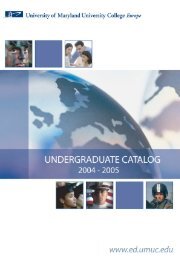UNDERGRADUATE CATALOG - UMUC Europe
UNDERGRADUATE CATALOG - UMUC Europe
UNDERGRADUATE CATALOG - UMUC Europe
Create successful ePaper yourself
Turn your PDF publications into a flip-book with our unique Google optimized e-Paper software.
CouRsE dEsCRiPtions<br />
ECon 210 tHRougH EdCP 100<br />
EConomiCs<br />
Courses in economics (designated ECON) may be applied as<br />
appropriate, for example, toward:<br />
G the general education requirement in the behavioral and<br />
social sciences;<br />
G a major in social science;<br />
G a minor in economics; and<br />
G electives.<br />
ECon 201 Principles of macroeconomics (3)<br />
An introduction to the problems of unemployment, inflation,<br />
and economic growth. Emphasis is on the roles of monetary<br />
policy and fiscal policy in determining macroeconomic policy.<br />
The efficacy of controlling wages and prices is analyzed.<br />
Students may receive credit for only one of the following<br />
courses: ECON 201 or ECON 205.<br />
ECon 203 Principles of microeconomics (3)<br />
Analysis of the principles underlying the behavior of<br />
individual consumers and business firms. Topics include<br />
problems of international trade and finance, distribution of<br />
income, policies for eliminating poverty and discrimination,<br />
problems of environmental pollution, and effects of various<br />
market structures on economic activity.<br />
ECon 301 Current issues in American Economic Policy (3)<br />
Prerequisites: ECON 201 and ECON 203. Analysis of<br />
current economic problems and public policies. Topics<br />
include market power, federal budget and tax policy,<br />
governmental regulation, inflation, unemployment, poverty<br />
and distribution of income, and environmental issues.<br />
ECon 380 Comparative Economic systems (3)<br />
Prerequisites: ECON 201 and ECON 203. A comparative<br />
analysis of the theory and practice of various types of<br />
economic systems, especially the economic systems of the<br />
United States, the former Soviet Union, the People’s Republic<br />
of China, Western and Eastern <strong>Europe</strong>, and less-developed<br />
countries.<br />
ECon 430 money and banking (3)<br />
Prerequisites: ECON 201 and ECON 203. An examination<br />
of the structure of financial institutions and their role in<br />
providing money and near-money. Institutions, processes,<br />
and correlations analyzed include the functions of the Federal<br />
Reserve System, the techniques of central banks, the control<br />
of the supply of financial assets as a mechanism of stabilization<br />
policy, and the relationship of money and credit to economic<br />
activity and prices. Students may receive credit for only one of<br />
the following courses: ECON 430 or ECON 431.<br />
160<br />
UndERGRAdUATE CATALoG | 2009-2010<br />
ECon 440 international Economics (3)<br />
Prerequisites: ECON 201 and ECON 203. A description<br />
of international trade and an analysis of international<br />
transactions, exchange rates, and balance of payments. Policies<br />
of protection, devaluation, and exchange-rate stabilization and<br />
their consequences are also analyzed. Students may receive<br />
credit for only one of the following courses: BEHS 440,<br />
ECON 440, or ECON 441.<br />
EduCAtion<br />
<strong>UMUC</strong> does not offer a major or minor in education. But<br />
courses in education from other institutions may be accepted<br />
as transfer credit and applied toward electives.<br />
Students enrolling for career purposes should inquire with the<br />
state where they plan to teach for information about specific<br />
curriculum requirements.<br />
EduCAtion PRinCiPlEs<br />
Courses in education principles (designated EDCP) do not<br />
apply toward teacher-certification requirements.<br />
Lower-level courses are intended to help students learn how<br />
to succeed in their college careers. They are recommended<br />
for students who have been away from school or who need to<br />
improve their academic skills.<br />
EDCP 100 and 103 do not fulfill the general education<br />
requirements in communications; they may be used as elective<br />
credit only.<br />
EdCP 100 Principles and strategies of<br />
successful learning (3)<br />
An introduction to knowledge and strategies designed to<br />
promote success in the university environment. Focus is on<br />
developing the study, interpersonal, and self-management<br />
skills and attitudes needed to achieve academic objectives.<br />
Topics include the university’s mission, resources, and<br />
requirements. A series of self-assessments serve as tools to<br />
identify values and goals for individual life planning and<br />
educational success.






